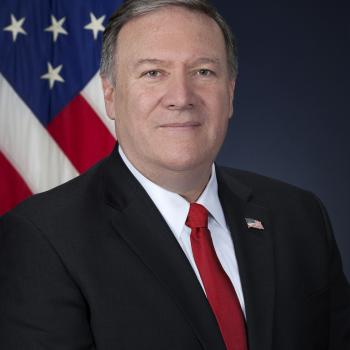In the last installment on this blog, your humble servant said that he would make an attempt to apply the Just War criteria of St. Thomas Aquinas to the latest American strike on Syria. [1] This he will now proceed to do, beginning with the pertinent quotation from Summa Theologiae, wherein St. Thomas lays out the three things that are necessary in order for a war to be just:
“First, the authority of the sovereign by whose command the war is to be waged. For it is not the business of a private individual to declare war, because he can seek for redress of his rights from the tribunal of his superior. Moreover it is not the business of a private individual to summon together the people, which has to be done in wartime. And as the care of the common weal is committed to those who are in authority, it is their business to watch over the common weal of the city, kingdom or province subject to them. And just as it is lawful for them to have recourse to the sword in defending that common weal against internal disturbances, when they punish evil-doers, according to the words of the Apostle (Romans 13:4): ‘He beareth not the sword in vain: for he is God’s minister, an avenger to execute wrath upon him that doth evil’; so too, it is their business to have recourse to the sword of war in defending the common weal against external enemies. Hence it is said to those who are in authority (Psalm 81:4): ‘Rescue the poor: and deliver the needy out of the hand of the sinner’; and for this reason Augustine says (Contra Faust. xxii, 75): ‘The natural order conducive to peace among mortals demands that the power to declare and counsel war should be in the hands of those who hold the supreme authority.’
 “Secondly, a just cause is required, namely that those who are attacked, should be attacked because they deserve it on account of some fault. Wherefore Augustine says (QQ. in Hept., qu. x, super Jos.): ‘A just war is wont to be described as one that avenges wrongs, when a nation or state has to be punished, for refusing to make amends for the wrongs inflicted by its subjects, or to restore what it has seized unjustly.’
“Secondly, a just cause is required, namely that those who are attacked, should be attacked because they deserve it on account of some fault. Wherefore Augustine says (QQ. in Hept., qu. x, super Jos.): ‘A just war is wont to be described as one that avenges wrongs, when a nation or state has to be punished, for refusing to make amends for the wrongs inflicted by its subjects, or to restore what it has seized unjustly.’
“Thirdly, it is necessary that the belligerents should have a rightful intention, so that they intend the advancement of good, or the avoidance of evil. Hence Augustine says (De Verb. Dom. [The words quoted are to be found not in St. Augustine’s works, but Can. Apud. Caus. xxiii, qu. 1): ‘True religion looks upon as peaceful those wars that are waged not for motives of aggrandizement, or cruelty, but with the object of securing peace, of punishing evil-doers, and of uplifting the good.’ For it may happen that the war is declared by the legitimate authority, and for a just cause, and yet be rendered unlawful through a wicked intention. Hence Augustine says (Contra Faust. xxii, 74): ‘The passion for inflicting harm, the cruel thirst for vengeance, an unpacific and relentless spirit, the fever of revolt, the lust of power, and such like things, all these are rightly condemned in war.’” [2]
Since St. Thomas’s first criterion will involve the most extensive and decisive analysis, we’ll look at the second and third criteria initially, and then return to consider the first. Under this plan, we will begin by considering whether the military action involved a just cause.
Now it is important to remember that your humble servant isn’t trying to evaluate U.S. involvement in Syria as a whole. Instead he is attempting to achieve a cogent analysis of the most recent U.S. military action which targeted sites “’specifically associated with the Syrian regime’s chemical weapons programme,’” [3] “after a suspected chemical attack on the then-rebel-held town of Douma, which opposition activists, medics and rescue workers say killed more than 40 people.” Whether the attack by the United States, the United Kingdom, and France was just, therefore, turns on whether the Syrian government really did engage in a chemical attack.
On this, there are arguments on both sides. Bashar al-Assad isn’t going to win the Nobel Peace Prize anytime soon. But at the time of the alleged chemical attack Douma was occupied by Jaysh al-Islam [4], an organization known for such atrocities as torture of prisoners [5], caging prisoners to use as human shields [6], and, quite possibly, using chemical weapons. [7] The Russians are claiming that the Douma chemical attack was a false-flag operation, and Jaysh al-Islam is a credible enough target of such an accusation.
Without access to intelligence reports, it is impossible to know for certain where guilt for the Douma chemical attack lies. What we can know is that the most recent attack on Syria can only involve a just cause if the Syrian regime was the guilty party.
 We are similarly ignorant when it comes to the just intent standard. Some are saying that President Trump ordered the attack as a way to distract from the accusations being leveled against him, and the activity of Special Prosecutor Robert Meuller. We can surmise, but only the President’s closest advisors can know with any certainty. What we can say is that if Donald Trump’s motive was either distraction or self-aggrandizement, his action in Syria was unjust. But it would be just if his intent was to prevent chemical attacks on the Syrian population, provided that the rest of the St. Thomas’s criteria were met.
We are similarly ignorant when it comes to the just intent standard. Some are saying that President Trump ordered the attack as a way to distract from the accusations being leveled against him, and the activity of Special Prosecutor Robert Meuller. We can surmise, but only the President’s closest advisors can know with any certainty. What we can say is that if Donald Trump’s motive was either distraction or self-aggrandizement, his action in Syria was unjust. But it would be just if his intent was to prevent chemical attacks on the Syrian population, provided that the rest of the St. Thomas’s criteria were met.
But the rest of St. Thomas’s criteria were not met. The first criterion requires that war be waged by those duly authorized. This is what the Catechism means when it says that the evaluation of the conditions for the moral legitimacy of a military action “belongs to the prudential judgment of those who have responsibility for the common good.” (Catechism of the Catholic Church, §2309) [8] Some have interpreted this as granting a kind of secular magisterial authority to governments in waging war, which is not legitimately to be questioned. But the fact that the government is to prudentially assess a proposed military action in light of the Just War Doctrine doesn’t mean that we are required to acquiesce in the claim that they have done so. Moreover, what the Catechism is telling us is that the decision to engage in an act of war is for the proper governmental authorities. An association of private citizens is not authorized by Catholic doctrine to wage war even in a just cause.
A look at the United Nations Charter and the U.S. Constitution makes it clear that President Trump was not properly authorized to engage in a military strike simply on his own initiative.
The UN Charter is a treaty to which the United States is a party, and Article VI of the U.S. Constitution provides that the “Constitution, and the Laws of the United States which shall be made in Pursuance thereof; and all Treaties made, or which shall be made, under the Authority of the United States, shall be the supreme Law of the Land….” [9] Violating the UN Charter, therefore, is a violation of U.S. law.
Chapter I, Article 2, Paragraph 4 of the UN Charter provides: “All Members shall refrain in their international relations from the threat or use of force against the territorial integrity or political independence of any state, or in any other manner inconsistent with the Purposes of the United Nations.” [10] It is obvious that in this case the United States used force against the territorial integrity of Syria in violation of this provision. Since the United States was not under attack by Syria, the only means by which the recent Syrian action could have been justified under the terms of the treaty would have been by an action of the UN Security Council pursuant to Chapter VII, Article 42 of the Charter [11], and no such action was taken in this case. The recent U.S. attack on Syria, therefore, was a clear violation of international law.
Then there is the Constitution. It may come as a surprise to some that the Constitution doesn’t authorize the President to initiate a foreign military action on his own, but gives the power of declaring war to Congress under Article I, Section 8. [12]
Now while it has long been decided, and doubtlessly originally intended, that the President may engage in a full defense against an attack on the United States without congressional authorization, since war in such cases has already arisen apart from any declaration of it [13], there is no reason at all to think that the War Power given to Congress is a dead letter. And although the Supreme Court unfortunately managed to sidestep the issue during the Vietnam War, all that means for present purposes is that we don’t have any Supreme Court precedent to say whether the Constitution permits a President to attack another country without congressional authorization or not. But it would effectively erase the War Power of Congress from the Constitution if it was ever decided that the President could do that.
 It is true that the War Powers Resolution permits the President to merely make a report to Congress within forty-eight hours after introducing American troops into foreign hostilities [14], and that the legislation gives the President a full sixty days to proceed with the operation without congressional approval. [15]
It is true that the War Powers Resolution permits the President to merely make a report to Congress within forty-eight hours after introducing American troops into foreign hostilities [14], and that the legislation gives the President a full sixty days to proceed with the operation without congressional approval. [15]
But it is also true that Congress is not empowered to amend the Constitution by simple legislation, which is what the War Powers Resolution is. Legislation cannot give the President more authority than he is granted under the Constitution. And the Constitution gives the President no authority whatsoever to attack another country without a congressional declaration of war.
Moreover, in situations where the United States has not been attacked, Congress itself has no authority under the UN Charter to authorize an attack on another country without a UN Security Council resolution permitting such an action. Even if the War Powers Resolution was constitutional, the United States would still be bound by its treaty obligations. It is thus evident that President Trump lacked the proper authority to launch an attack on Syria. He stood in no better a position than would a private citizen in ordering the strike on the Syrian facilities, and so it is clear that the action failed to meet St. Thomas Aquinas’s first condition for a just war.
The icon of St. Joseph the Worker is by Daniel Nichols.











